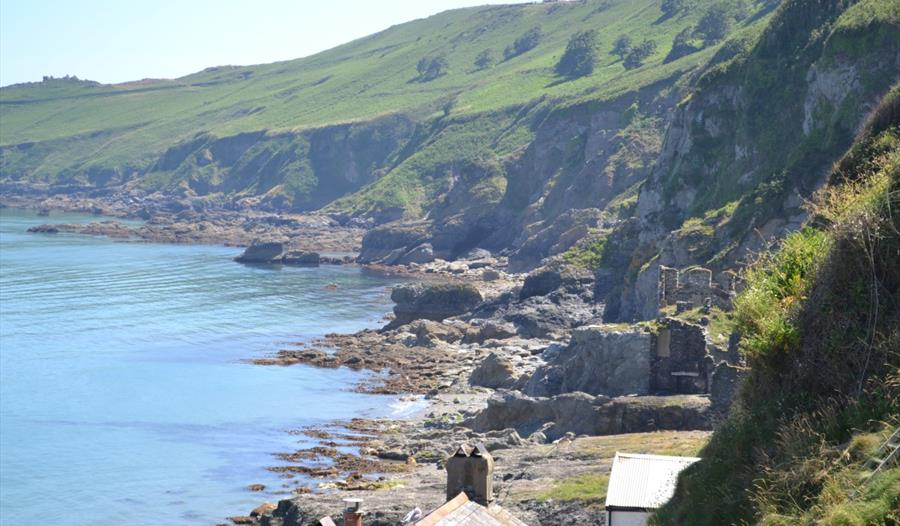To build your own Itinerary, click  to add an item to your Itinerary basket.
to add an item to your Itinerary basket.
Already saved an Itinerary?


The atmospheric ruined fishing village of Hallsands stands as testament to the power of the sea and the danger of over exploiting natural resources. It probably originated in about 1600 and grew during the 18th and 19th centuries. By 1891 it had 37 houses, a pub called the London Inn and a population of 159. Most residents owned their own homes and depended on fishing, particularly for crab for a living. It was a hazardous business, with irregular earnings, and frequent losses at sea. Everyone, including women and children, helped haul in the boats and nets. It was a very close community.
In the 1890s, the Admiralty decided that the naval dockyard at Keyham, near Plymouth, should be expanded. The scale of the undertaking was vast and required hundreds of thousands of tons of concrete. In January 1896 the construction contract was awarded to Sir John Jackson Ltd, who was also granted permission by the Board of Trade to dredge shingle from the coast between Hallsands and neighbouring Beesands. An inquiry was established in response to protests from villagers, who feared that the dredging might threaten their beach and village. The inquiry found that the activity was not likely to pose a significant threat, so dredging continued. However by 1900 the level of the beach had started to fall. In the autumn storms that year, part of the sea wall was washed away. In November 1900, villagers petitioned their Member of Parliament complaining of damage to their houses, and in March 1901 Kingsbridge Council wrote to the Board of Trade complaining of damage to the road. In September 1901 a new Board of Trade inspector concluded that further severe storms could cause serious damage and recommended that dredging be stopped. On the 8th January 1902 the dredging licence was revoked. During 1902 the level of the beach recovered somewhat but the winter brought more storms and damage. During the night of the 26th January 1917, a combination of easterly gales and exceptionally high tides breached Hallsands' defences and the village fell into the sea! Miraculously no one was hurt. Many families relocated to neighbouring villages North Hallsands and Beesands having lost everything to fight the long battle for compensation which took seven years!
Only one house was left standing by the 27th, on the road leading down to the village. It was owned by Elizabeth Prettyjohn who stubbornly refused to leave, and lived there with her chickens until her death in 1964, aged about 80 years. She acted as a guide to the visitors who came over the years curious to see the remains of the village. Today her house is used as a summer holiday home.
Another famous Hallsands resident was Ella Trout and her sisters Patience, Clara and Edith. When their fisherman father, William, became sick, Patience and then Ella gave up school and operated his boat which was the only source of income for the family. William died in 1910 when Ella was 15 years old. On the 8th of September 1917, after the Hallsands disaster, Ella was out in the boat crab fishing with her 10 year old cousin William, when they saw the SS Newholm struck by a naval mine one mile south of Start Point. With William Stone, another fisherman in the vicinity, they rowed to the scene and helped rescue nine men. In recognition of her bravery, she received the Order of the British Empire. The sisters, with compensation for the destruction of their cottage at Hallsands and their own earnings, built Trout's Hotel on the cliff above the deserted village. The Touts ran the hotel successfully until 1959. More recent owners moved down from London and attracted some of their old friends down to stay, including Danny La Rue and Larry Grayson, for years their signed photographs hung on the walls of the dining room come small cafe. Today the remains of the old village are closed, although there is a viewing platform so that you can get a better look over the cliffs to the ruins, and the Trout’s hotel is called Prospect House and has been converted into apartments.
In 2006 the story of Hallsands was turned in to an opera called ‘Whirlwind’ commissioned by acclaimed opera company Streetwise Opera, and written by Will Todd one of the country’s leading young opera composers and Ben Duwell.
View
Close